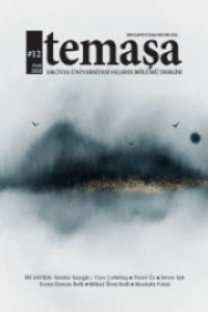H. Vaihinger’in Bilim Eleştirisi: Bilim Bir Kurgu Mudur?
Bilim, insanoğlunun yaşam ve evrene dair tatmin edici açıklamalar yapma çabasının sonuçlarından biri olarak kabul edilebilir. Bilimin en temel özelliği doğrulanabilir, kesin ve dolayısıyla evrensel geçerliliğe sahip önermelerden oluşmasıdır. H. Vaihinger Sanki Felsefesi isimli eserinde bilim de dahil olmak üzere insanoğlunun tüm teorik, pratik, dini düşünme ve eyleme biçimlerinin kurgular vasıtasıyla inşa edildiğini savunur. Ancak bilimin nitelikleri ve kurgular düşünüldüğünde bu iki kavramı yan yana getirebilmek oldukça zor gibi gözükmektedir. Her ne kadar kurguların bilimsel kuramsallaştırmada bir rolü olduğu fikri gittikçe yaygınlaşsa da geleneksel olarak kurguların bu işlevi sıkça reddedilir. H. Vaihinger Sanki Felsefesi isimli eserinde bilimsel önermelerin temelinde kurgular olduğunu düşünce tarihinde kendisini destekleyecek isimler ve onların kuramları üzerinden göstermeye ya da kanıtlamaya çalışır. Bu çalışmanın amacı da H. Vaihinger’in kurgular teorisi üzerinden insanın kendini ve evreni anlama çabası içinde kurguların özel ve merkezi bir rol oynadığını bilimsel önermeler ya da kuramsallaştırmalar üzerinden göstermeye çalışmaktır. Ayrıca bilimsel olsa da kurguların bazı gerçeklere karşılık gelmediği görüşünü H. Vaihinger’in klasik açıklaması bağlamında konumlandırarak hem bilim ve kurgular arasındaki ilişkinin değerlendirilmesi hem de Türkçe literatürde hiç bilinmeyen H. Vaihinger’in literatüre kazandırılması hedeflenmektedir.
H. Vaihinger's Critique of Science: Is Science Fiction?
Science can be considered as one of the results of human beings' efforts to provide satisfactory explanations for life and the universe. The most fundamental feature of science is that it consists of propositions that are verifiable, certain, and therefore universally valid. H. Vaihinger argues in his work called The Phılosophy of As If that all theoretical, practical, religious ways of thinking and acting of human beings, including science, are constructed through fictions. However, considering the qualities of science and fictions, it seems very difficult to bring these two concepts side by side. Although the idea that fictions play a role in scientific theorization is increasingly common, this function of fictions has traditionally been frequently denied. H. Vaihinger tries to show or prove that there are fictions on the basis of scientific propositions through the names that will support him in the history of thought and their theories in his work called The Phılosophy of As If. The aim of this study is to try to show, through scientific propositions or theorizations, that fictions play a special and central role in the effort of man to understand himself and the universe through H. Vaihinger's theory of fictions. In addition, it is aimed to evaluate the relationship between science and fictions and to bring H. Vaihinger, who is never known in Turkish literature, to the literature by positioning the view that fictions do not correspond to some facts even though they are scientific, in the context of H. Vaihinger's classical explanation.
Keywords:
H. Vaihinger, Science, Fiction, Hypothesis, Theory, Mathematics, Atom,
___
- Appiah, K. Anthony. As If: Idealization And Ideals. England: Harvard University Press., 2017.
- Denkel, Arda. Bilginin Temelleri. Ankara: Doğu Batı Yayınları, 2021.
- Engels, Frederic. Doğanın Diyalektiği. Çeviren: Akif Gelen, Ankara: Sol Yayınları, 1979.
- Ewijk, P. Van. “Life Must Be Led in the Dark Hans Vaihinger’s The Philosophy of “As If”’ in William Gaddis’s The Recognitions,” Orbis Litterarum 65:5, (2010): 372-387.
- Fine, Arthur. “Fictionalism,” Midwest Studies in Philosophy 18:1, (1993): 1-18. https://doi.org/10.1111/j.1475-4975.1993.tb00254.x
- Frigg, Roman. “Fiction in Science,” Article in Bridges A Jewish Feminist Journal (April 2006): 1-34.
- Goethe, J. W. Renk Öğretisi. Çeviren: İlknur Aka, İstanbul: Kırmızı Kedi Yay., 2013.
- Lange, F. A. The History of Materialism. Traslation: E. C. Thomas, London, Kegan Paul, Trench, Trubner & Co, Ltd, New York: Harcourt, Brace & Company, Inc, 1925.
- Liebmann, Otto. Zur Analysis der Wirklichkeit: Eine Erörterung der Grundprobleme der Philosophie. Überarbeitete Dritte Auflage, Walter de Gruyter GmbH & Co KG, 2020.
- Maki, U. “Vaihinger on Fictions in Science: Essays in Honour of Raimo Tuomela” in Semi-Ramistic Studies: Essays in Honour of Raimo Tuomela, Editörler: I. Patoluoto, M. Sintonen and L. Taiminen, 32-37. Helsinki: University of Helsinki Press, 1980.
- Miller, Eric. “Literary Fictions and As-If Fictions,” Philosophy & Rhetoric 30, no: 4 (1997): 428-442.
- Pincock, Christopher. “Fictions in Science: Philosophical Essays on Modeling and Idealization,” International Studies in the Philosophy of Science 25:2, (2011): 196-199. https://doi.org/10.1080/02698595.2011.574867
- Podnieks, K. “Philosophy of Modeling in the 1870s: A Tribute to Hans Vaihinger,” Baltic J. Modern Computing 9, no: 1 (2021): 67-110. https://doi.org/10.22364/bjmc
- Pollard, S. “As If Reasoning in Vaihinger and Pasch,” Erkenntnis 73(1), (2010): 83-95. https://doi.org/10.1007/s10670-009-9205-7
- Pringe, Hernan. “The Fiction of The Affecting Object in Hans Vaihinger’s Philosophy,” Studi Kantiani 24, (2011): 105-118.
- Vaihinger, Hans. The Phılosophy of ‘As If’: A System of The Theorical, Practical and Religious Fictions of Mankind. Translated by. C. K. Ogden, London: Kegan Paul and Co.; Ltd.; New York, Harcourt, Brace and Co.; Inc.; 1935.
- Woods, Alan and Ted Grant. Aklın İsyanı. Çeviren: Ufuk Demirsoy ve Ömer Gemici, İstanbul: Yordam Basın Yayın Matbaacılık Turizm Tic. Ltd. Şti., 2018.
- Woolhouse, R. S. Ampirist Filozoflar. Çeviren: Gökhan Murteza, İstanbul: Pinhan Yayıncılık, 2019.
- Yıldırım, Cemal. Bilim Felsefesi. İstanbul: Remzi Kitapevi, 2012.
- Yıldırım, Cemal. Bilimin Öncüleri. Ankara: Tübitak Popüler Bilim Kitapları, 1995.
- İnternet Kaynakları Hedrich, Reiner. “String Theory - From Physics to Metaphysics,” Submitted on 20 Apr 2006. https://arxiv.org/abs/physics/0604171
- Podnieks, K. “Correcting Vaihinger' s Fault Intended as Part of The Paper: Philosophy of Modeling in 1870s: a Tribute to Hans Vaihinger,” Erişim 18 March 2020. https://www.researchgate.net/publication/331113857_Correcting_Vaihinger’s_Fault
- “Some Reflections on Hans Vaihinger,” Erişim 05 January 2020. https://thejudoka.com/application/files/7615/5147/0948/as_if_vaihinger_and_brunton.pdf
- ISSN: 2148-371X
- Yayın Aralığı: Yılda 2 Sayı
- Başlangıç: 2014
- Yayıncı: Prof. Dr. Arslan Topakkaya / Erciyes Üniversitesi Felsefe Bölümü
Sayıdaki Diğer Makaleler
Cezanne’dan Hareketle Merleau-Ponty’nin Fenomenolojisinde Sanatın Önemi
Ampirist Geleneğin Dil Felsefesine Katkıları
Gazzali Descartes'ın Felsefesine Etki Etmiş Midir?
Patikalardan Otobanlara Hız Kültürü Karşısında Yavaşlamanın İmkanı Üzerine Bir Soruşturma
Foucault'da İktidarın Ötekileri
Melike AKPINAR, Arslan TOPAKKAYA
Kore Budizm Geleneğinin Kurucusu Jinul’un Hayatı ve Felsefi Kişiliği
Hatice KÖROĞLU TÜRKÖZÜ, Sümeyra SARAÇOĞLU
Saul Aaron Kripke Semantiğinde Özel Adlar ve Gönderim Problemi
Gülsima URTEKİN, Serdar SAYGILI
İşlevselcilik Qualia'yı Reddeder mi?
